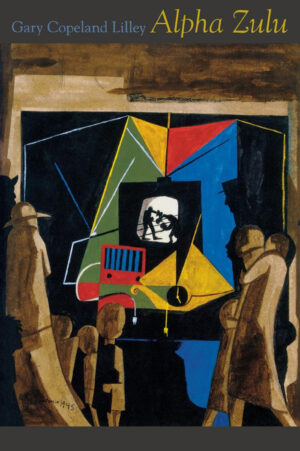Alpha Zulu
by Gary Copeland Lilley
reviewed by Andrew DuBois
This volume of poems by Gary Copeland Lilley—a poet described on the back of the book as an “outsider artist,” who indeed turns out to be one but in unexpected ways—wears its cover well. The illustration, a painting called “Television” by Jacob Lawrence, depicts a group of people in black, brown, and beige peering through the window of an electronics store at night. They are on the outside looking in at the burst of color that is a TV broadcasting a boxing match. Both the image and the poems employ a subtle and consistent chromatic or tonal frame that is both dynamic and dark. Central to both is the idea of aggression, but aggression transformed into artful battle, a contest of discipline, skill, and craft.
Lilley’s title is similarly apt. The dominant figure in many of these poems is an alpha male, or rather, a black alpha male, or in Lilley’s formulation, alpha zulu. The poems are rich in the iconography of Christian tradition, as asserted in the echoes of the “alpha and omega,” while the African-American heritage of revising and deepening that tradition is heard in alpha zulu. The military’s alphabetic call signs are also there; Lilley is a veteran of the U.S. Navy Submarine Force, an experience he draws on in several of the poems. And in the stark trochees that encompass so much meaning in two totalizing bursts of rhythm, alpha zulu begins to suggest the poetic skill that characterizes this stellar and unique volume.
Alpha Zulu is a book of archetypes fleshed out, so that there is something both immediate and timeless in its lines. An underworld aesthetic is pervasive, giving the poems a classical feel. Not contradicting this, its characters are often straight-up Southern Gothic with an African-American twist. A lot of whiskey is drunk in this book. Juke-joints are still called juke-joints. There is a black cat which, having been scarred by “boiling water / or a chemical cleaner,” slinks “low and close to the fences” until its fur grows back. There is a grandfather who is an itinerant preacher, a grandfather who hauls wood to stills by mule and cart, a cross-dresser named Raven, a roadhouse owner named Sugar, a racehorse gambler named Zoot, a Boneman who smashes men’s bones for money, an anonymous God-driven killer of whores, and a pack of ten poems in the guise of tarot cards.
Such a collection could veer with speed into the hackneyed. What happens instead is that we fully enter a world—of hidden black history, of deprivation and desperation, of defensiveness and pride, of transience from rural towns to big cities and back—that in many contemporary volumes would be inadequately encapsulated by a pop cultural reference or an allusion to the blues. This book does not merely point to, but is an actual manifestation of the blues; it does not merely gesture toward, but actually manifests a milieu. Lilley is an “outsider artist” not in the way of elaborate and sometimes violent obsessions à la Henry Darger (although many of the poems are populated by obsessive and violent speakers), or of idiosyncratic religiosity à la Howard Finster (although there are apocalyptic and prophetic overtones throughout). He is an “outsider” because he writes with unsentimental sympathy of social outsiders; because, as someone who has left and then returned to a rural home, he stands slightly outside of his origins; and because his aesthetic is outside of the current poetic mainstream, more folk culture than pop culture, more reactionary-on-purpose than attempted avant-garde.
These are some reasons for reading Lilley, yet none of these accounts for why Alpha Zulu is so compulsively readable, or for why it gets better the more it’s read. Lilley’s formal craft, muted and sure of its way, provides the best answer. Just as his subject matter has an organic nature, so too do his formal choices. Variety here is not lack of focus or an attempt to show off, but a necessary range of response to different dilemmas of character, story, and mood. The eponymous “Ranter on the Corner of Babylon and Manhattan” rails appropriately in unpunctuated prose, just as the less propulsive language of “November 11: Veterans Day at Rite Liquor Store and Bar” represents the quotidian. “Boneman” smashes at us in a single long stanza of short lines with a blunt diction that is less simple than sinister. The sestina “Angels in the Geek Hour of the Morning” uses the form’s repetitive structure to convey the closed-circuit lives of hookers and johns. Lilley’s tercets are tight, his couplets contained, so long as the subject demands it, and when the demands are loosened, the form follows suit.
Best of all are the sonnets scattered throughout, as well as the poems that are near sonnet-length. (The Tarot Card poems are thirteen lines each and he also writes strong twelve-line stanzas.) Lilley demonstrates particular mastery of a compact and self-sufficient form, where every fine enjambment is a well-greased gear, every pause a cog, every right word another screw helping hold it all together. These poems allow us to see how tension is handled in an enclosed space—fittingly so, for a man who in a longer poem confesses: “I’m claustrophobic. I’ve made / eight submarine patrols / and this was a truth I knew / after the first four.” The dark humor, self-knowledge, and depth signified here are characteristic of the book as a whole, one of the best to surface in a while.
Published on March 6, 2015

